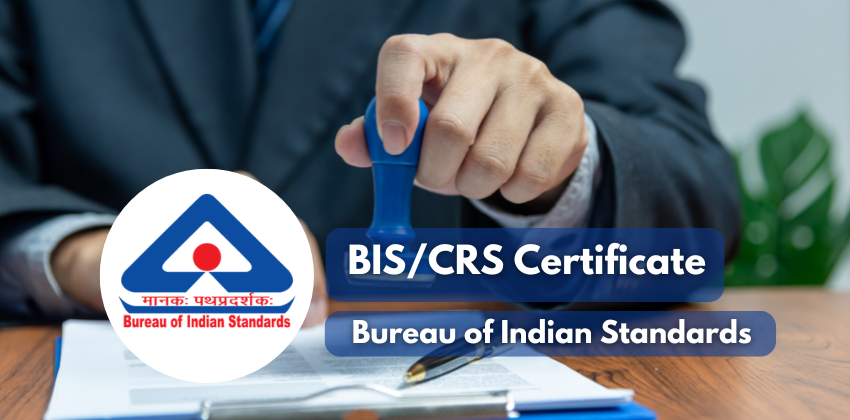
What is BIS CRS Scheme?
The Compulsory Registration Scheme (CRS) is a product certification program administered by the Bureau of Indian Standards (BIS) under the authority of the Ministry of Electronics & Information Technology (MeitY) and other nodal ministries. The scheme mandates registration of specific products with BIS before they are manufactured, imported, or sold in the Indian market.
The CRS was first introduced by MeitY (formerly DeitY) through the Electronics and Information Technology Goods (Requirements for Compulsory Registration) Order, 2012, notified on 03 October 2012, initially covering fifteen categories of electronic goods. Over time, additional product categories have been brought under the scope of the CRS Scheme through subsequent notifications.
In addition to MeitY, several other ministries have brought critical product categories under the Compulsory Registration framework:
- Ministry of New and Renewable Energy (MNRE): Notified 5 solar products under the Solar Photovoltaics, Systems, Devices and Components (Requirements for Compulsory Registration) Order, 2017 (dated 30 August 2017)
- Ministry of Chemicals and Fertilizers: Notified products under the following Quality Control Orders:
- Ortho Phosphoric Acid
- Polyphosphoric Acid
- TrimethylPhosphite
- Ministry of Textiles: Notified Cotton Bales under the Cotton Bales (Quality Control) Order, 2023
What types of products are covered under the CRS Scheme?
Under the BIS Compulsory Registration Scheme (CRS), a wide range of electronics, IT products, solar devices, and select chemicals and textiles are covered. The products are notified by respective ministries — primarily MeitY, along with MNRE, Ministry of Chemicals and Fertilizers, and Ministry of Textiles.
What is the objective of the BIS CRS Scheme, and why is it important?
The objective of the BIS CRS Scheme is to ensure that notified electronic, IT, and other products conform to Indian safety and quality standards before being sold or imported in India. It aims to protect consumers from hazardous or substandard products, promote standardization, and regulate the market.
The scheme requires manufacturers to get their products tested in BIS-recognized labs and registered before sale. This ensures product safety, builds consumer trust, and helps in the enforcement of compliance. It also supports the government’s “Make in India” initiative by ensuring both domestic and imported products meet consistent quality benchmarks.
Who is required to obtain registration under the BIS CRS Scheme?
Under the BIS Compulsory Registration Scheme (CRS), manufacturers of notified electronic, IT, solar, and other specified products are required to obtain BIS registration before selling, importing, or distributing these products in the Indian market. This applies to both domestic manufacturers and foreign manufacturers.
In the case of imported goods, foreign manufacturers must appoint an Authorized Indian Representative (AIR) to apply for registration on their behalf. Registration must be obtained for each manufacturing location and each product model individually. Only after registration can the products bear the BIS CRS mark and be legally sold in India.
Step-by-Step Process to Register a Product under the BIS CRS Scheme
Step A: Identify Applicable Standard
Determine the relevant Indian Standard (IS) for your product as mandated by BIS.
Step B: Product Testing in India
Test your product in a BIS Recognized Laboratory to ensure compliance with standards.
Step C: Prepare Required Documents
Gather documents such as test reports, product details, and company credentials.
Step D: Appoint AIR (For Foreign Manufacturers)
Appoint an Authorized Indian Representative (AIR) for liaison and accountability in India.
Step E: Submit Online Application
Apply through the BIS CRS portal by uploading all documents and reports digitally.
Step F: Application Scrutiny by BIS
The BIS authority examines your submission and verifies compliance with standards.
Step G: Grant of Registration
After successful verification, the CRS certificate is granted for your product.
procedure for Licence
What is the time duration for the grant of registration under the BIS CRS Scheme?
The time required to obtain BIS registration under the CRS Scheme is typically around one month. However, this duration can vary depending on several factors, including the completeness of the application, product, timely submission of test samples, and the responsiveness to BIS queries during the evaluation process.
What is the validity of the registration granted under the CRS Scheme?
The registration granted under the BIS Compulsory Registration Scheme (CRS) is initially valid for 2 years from the date of issue. After the initial period, it can be renewed for a further period of up to 5 years at a time, subject to continued compliance with the applicable Indian Standard and other BIS requirements. Renewal applications must be submitted of the existing registration along with updated documents and test reports, if required.
Registration Fee under the CRS Scheme for Imported Products
The following are the applicable charges for a new BIS CRS application for imported products:
| Component | Fee (in ₹) | Remarks |
|---|---|---|
| Application Fee | 1,000 | One-time non-refundable fee |
| Processing Fee | 50,000 | Includes one test report |
| Annual Licence Fee | 1,000 per year | Payable for each year of the license term |
| Total Fee (for 2 Years) | ₹53,000 + 18% GST | Includes processing & application fee + license for 2 years |
| Additional Test Report (if any) | ₹20,000 + 18% GST | Charged per additional report with application |
Note: The fees mentioned above are applicable only for new applications under the BIS CRS Scheme for imported products. Additional charges may apply depending on the number of product models or variants.
How can we help you?
At BR & Associates, we assist with end-to-end BIS CRS registration, including product evaluation, documentation, testing coordination, application filing, and regulatory liaison. Whether you're a domestic or foreign manufacturer, our team ensures smooth, compliant, and timely certification under the CRS Scheme—enabling legal market access and seamless import clearance.

Need more help?
Feeling inquisitive? Have a read through some of our FAQs or contact our Supporters for help











